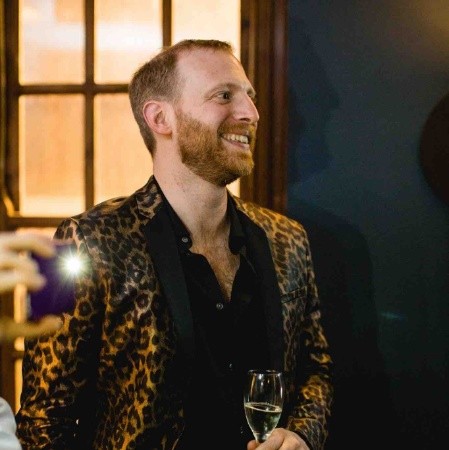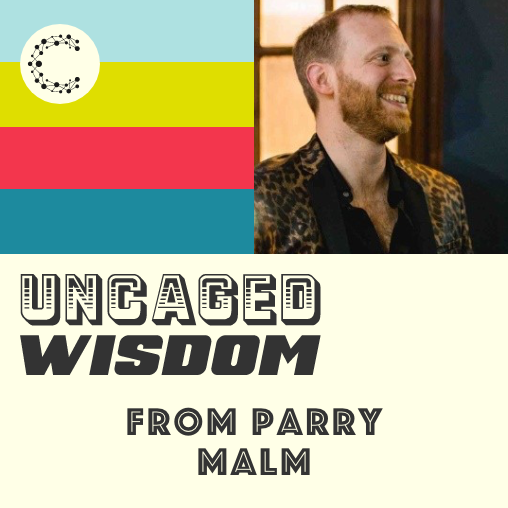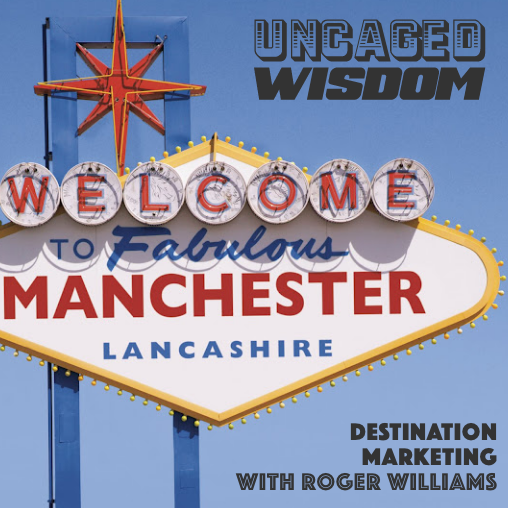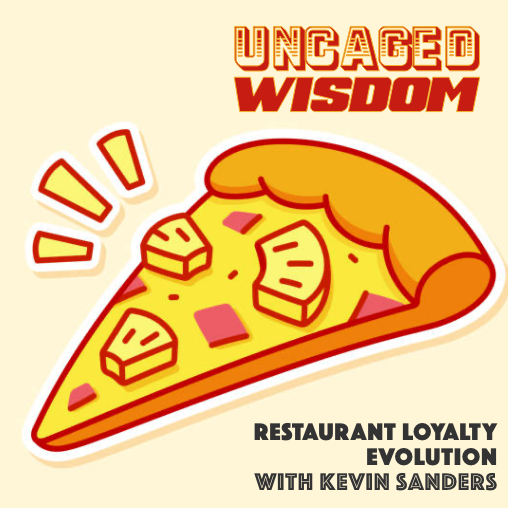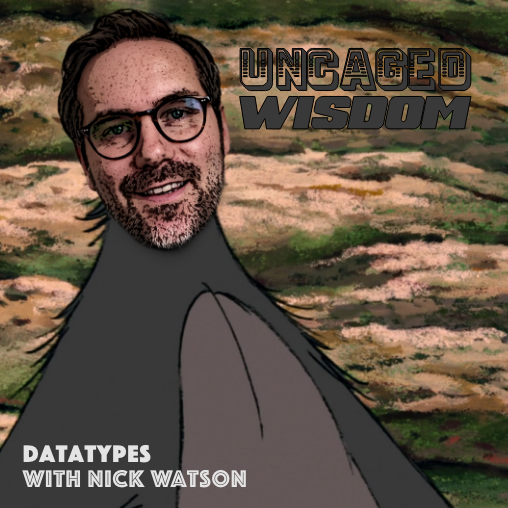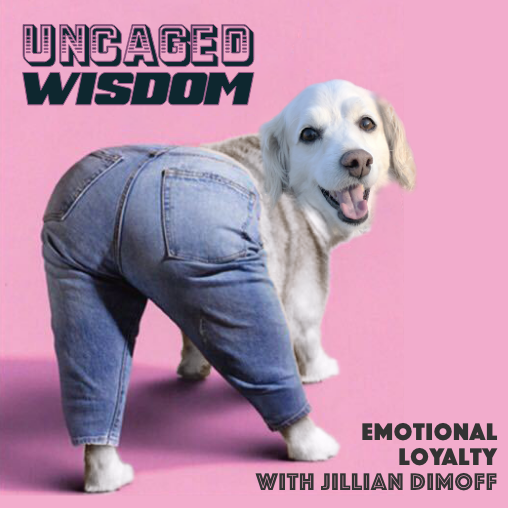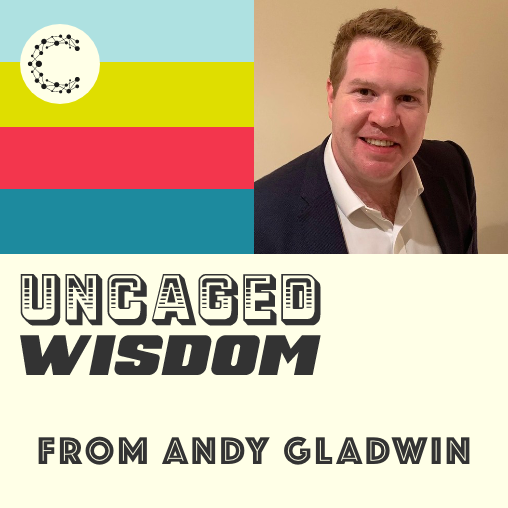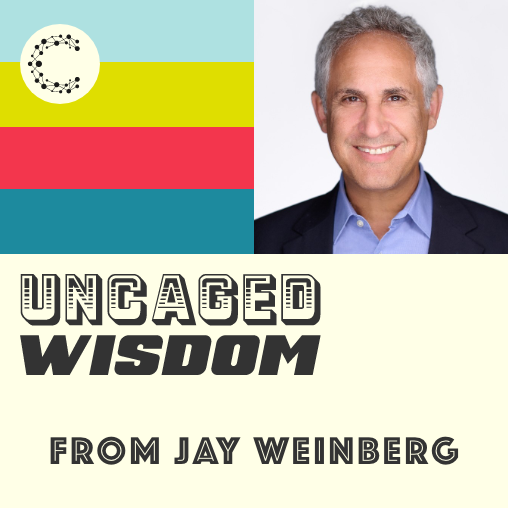Rewriting the Digital Marketing Playbook w/ Parry Malm
- 0.5
- 1
- 1.25
- 1.5
- 1.75
- 2
Parry Malm: It's like you can't believe everything influencers say on Instagram.
Kayla Siegmeier: Who knew?
Julian Bracey-Davis: When will we learn?
Kayla Siegmeier: Uncaged Wisdom, Cheetah Digital's podcast for modern marketing.
Julian Bracey-Davis: Hello, and thanks for tuning into another episode of Uncaged Wisdom, the podcast for modern marketers. I'm Julian Bracey- Davis. We like words. Words are good. If we can make words and sentences better in our communications, well, by gum, we'll try. Having the bestest words and sentences is also very important to the brands we work with, as they try to find the right things to say to individual consumers. With that in mind, on this special episode of Uncaged Wisdom, we are joined by Canada's best export since Rush and Keanu Reeves. Parry Malm is the CEO at Phrasee, an AI powered SaaS platform that revolutionizes customer experiences through brand language optimization. Parry will be telling us how Phrasee is rewriting the digital marketing playbook, one optimized word at a time. So let's see what he has to say.
Kayla Siegmeier: What is an ad piece that really influenced your desire to join marketing?
Parry Malm: So growing up on the mean streets of the suburbs of Vancouver in Canada, in the early nineties, you did a few things. Number one, you grew a mullet. Number two, you watched hockey. And number three, you knew everything about every wrestler to ever step into the square circle. And what really attracted me to wrestling was, first of all, the drama of it. It was storytelling, but nobody ever got hurt beyond the injuries that the sports entertainers get through the applying of their craft. One thing that always stuck with me though, is how every single wrestler who is successful, always had a catch phrase. And those catch phrases have stuck with me throughout the years. So, if you ever wonder what it smells like when The Rock is cooking. Or give me a hell yeah, and that's the bottom line because Stone Cold said so. Or even going back further, and old Curt Hennig saying," And that's perfect." These things just stick in your mind, and always sort of struck me that it's really impactful. And when you can get 20,000 people at the PNE Agrodome in east Vancouver, saying your catchphrase along with you, then you really got something there. And it really sort of showed me what the power, the limitless power of language can have.
Speaker 4: inaudible What The Rock is cooking.
Julian Bracey-Davis: The Moose had phrases as well.
Parry Malm: I mean, I was always parsing Bret, The Hitman, Hart, sharp shooter. Because once he locked it in, you were done. There's no coming back.
Julian Bracey-Davis: It's game over man, game over. How did you find yourself in Europe? What's the sort of origin story? I guess wrestlers have origin stories and inaudible but what's your particular one?
Parry Malm: I've always been a bit of an anglophile. My mum's English, half of my grandparents were English inaudible a boy growing up. And always, just back in the nineties, I'd always just want to go to England. I was always specifically London, right? I always had this thing about DM clash, the Sex Pistols, Blur, all those Seminole London bands. I'm like, I need to be a part of that. So I found out, right, that by virtue of my grandmother being English... Because my mom doesn't have an English passport, long story. My grandmother did. By virtue of her being English, I could get what they call a UK ancestry visa. So I got that and I said," Okay, I'm just going to move to London." So I wound up in London in August of 2006, I had about 1000 pounds to my name and two suitcases. And I just went there for two or three months just to experience life, and here I sit, 50 and a half years later and they haven't gotten rid of me yet.
Julian Bracey-Davis: Yeah. Were you in the ad world?
Parry Malm: So I started working brand site for a big multinational and did that for a few years, which was the full gamut of marketing stuff, both from agency management, all the different channels, stuff like that. It was cool. And then it was cool until it wasn't. So then I wound up joining one of our vendors who was a marketing technology provider, and wound up working there for three and a half years in order to run the customer success function, which was cool. Had a great time doing that. And then I left there because I had spent three and a half years there and I was just like, I don't want to have a boss anymore. And then I joined Phrasee. Well, I didn't join Phrasee, I kind of invented Phrasee.
Julian Bracey-Davis: What was the Phrasee moment where you were like, actually, there's an idea here.
Parry Malm: When I was doing marketing brand side, I would send out millions of emails to millions of people, right? And I would test out all sorts of subject lines and one of them would work and one of them wouldn't, and I'd always go, why does this one work? And I'd try my damnedest to build some sort of predictive equation to do something with that, but I could never get it right. It was much more of a complex problem than I could work out. I can work out most problems, so it was quite flummoxing. So then when I joined the MarTech company, they were operating in the email space. I talked to hundreds and hundreds and hundreds of customers throughout the world. And the number one question that they would always ask me is," What makes a subject line good?" My answer was always just, try out a bunch of stuff and one of them might work. And that always felt really intellectually incurious to me, right? And I didn't have a better answer. So I got bored one day and I go out talking to one of our Devs and I'm like," Hey, could you download me the 50, 000 most recent subject lines our customers have sent out with their open rates and click rates and unsubscribed rates and stuff? Just so I can have a bit of a play with it." So then I was looking through the data and I built this little thing in Excel where you put in a keyword and then it would spit out the impact that keyword had on open rates, click rates, stuff like that. I'm like, oh, it's cool and it's neat. So I thought of a bunch of words and I tested them out, and then I put them into a white paper type thing and wrote a blog about it. And I clicked post on the blog and I went home that night. I got into work the next morning and our head of sales called me up and he's like," You just made my life a living hell." And I'm like," Oh, what's going on, man? What's the crack?" So every time somebody downloaded that white paper, it created a lead in Salesforce, our CRM system, which would then ping him a notification going, somebody just downloaded this thing. And there was 10, 000 of them overnight, so his inbox just basically exploded, right? And it was all from people who were just interested in learning more about the language you should use in subject lines. And that's when I thought to myself, there's clearly demand for something here. I did a quick scour of the market and there was just nothing tradable out there.
Julian Bracey-Davis: Other than your just natural curiosity, did you have a sort of, even at school, a background in writing different things or just being curious of the phrases?
Parry Malm: Look, my mom was a languages teacher and my dad was a physicist/ engineer who took an AI product to market in the nineties. So I guess I'm my parent's son.
Speaker 6: I'd call that a big, yes.
Julian Bracey-Davis: So Parry, with all that in mind, how would you sum up your company?
Parry Malm: The concept is quite simple. For years and years, as marketers, we've been fed this story that we need the right message to the right person at the right time. Now, there's all sorts of personalization and segmentation tools to sort out the right person issue. That's a solved problem. And then the right time, we got APIs, we got triggers. You can send people messages within seconds based upon any action which they take. So we got the right time things sorted. We spent so much time focusing on the right person and the right time, we've forgotten about the right message. So that's the exact problem that Phrasee solves, we help brands say it better. And we do that by using advanced AI techniques to optimize and analyze the language which you use in your brand language optimization. The best way to think about it is this, if you get emails from eBay, Walgreens, Domino's, a whole bunch of brands which you probably interact with on a daily basis, then you use us, not only in email, but across the marketing spectrum, to optimize the languages that are... The language that their brands use. So you've probably bought stuff as a direct result of Phrasee's kit. So I don't know if I should be apologizing or congratulating, based upon that fact.
Julian Bracey-Davis: How do you start off as a brand, working with yourselves, to find that golden message?
Parry Malm: So let's step back a bit and let's think about the way that things used to be done, right? So let's say that we were going to do... It doesn't matter if it's a Facebook, an email, a push message. It doesn't matter. Let's just stick with email as the example, to keep it simple. Let's say you work for a shoe company and you got to send out an email saying that shoes are half off, right? Pretty standard thing. The way that people used to work is, they would fill out briefing form and they would send that to a Don Draper type. The esteemed doyen of creativity and copywriting. Mr. Draper would sit there in his fancy three- piece suit, in his corner Madison avenue office, and he put his feet up on the counter and he would look out the window wistfully, sipping on some whiskey, patting his secretary's bum. And he would think. Mr. Draper would think and then he would think a bit more. And then he would use his extreme creative prowess to write some language for you to then use. He would send that back to you, and then you would go through it and you would put in your two cents about what you think is good, what you think is bad. Then you would show it to your boss, and they'd put in their two cents. And everybody has an opinion about language, from the CEO to the janitor, right? So then, the one you wound up going with and taking to market, is the one that the most persuasive person in the audience or in your team, convinced you is the best one. Often the boss, right? What you're doing is, you're extrapolating one person's gut feeling on millions and millions of people. And I don't know about you, but gut feeling is fundamentally fallible. So, that's the old way of working. The way that Phrasee works, is like this. Instead of briefing the esteemed Mr. Draper, you brief Phrasee's AI, which is just a SaaS product, which you log into. It then runs it through what's called a natural language generation system, which will create thousands and thousands and thousands of ways of saying the same thing. Imagine a thousand Don Draper's on a thousand typewriters. Now that by itself, is not actually that useful. It peaks a lot of intellectual curiosity, but you don't need thousands of ways of saying the same thing. You need a small amount of ways of saying something very effectively. So what we then do is, we layer a deep learning engine. If you're wondering what deep learning is, it's a form of machine learning that sounds more expensive. And we feed it through there, where it takes all of the information that the 1000 Don Drapers on 1000 typewriters have written, and then it ranks them from best to worst, with higher accuracy than any human on the planet. We then sample from that ranking, to give you the output of highly effective language. So what that effectively means is, we are cutting out, first of all, the cognitive task of writing the same thing in a bunch of different ways because that's actually quite challenging. But then we're cutting out this very biased task of trying to pick which one to then use, and trusting that one person's gut feeling is superior to everyone else's. We've removed those two problems and you get, by clicking a single button, one bit of language that's more effective than what humans write.
Julian Bracey-Davis: I mean, we're trying with our brands, obviously to get the message out to the right people at the right time and the right place. And that's that. But the right message is at the heart of everything you should be sending. And to your point you made a minute ago, that's something that's been forgotten.
Parry Malm: Absolutely, man. I mean, I could log into a system right now and I could send a million messages to a million people by clicking a single button. But what if that message sucks? All that effort, all that operational efficiency that has been built up through technology stacks over the last 10 or 15 years, it's all just a waste of time. And more importantly, a waste of money. If your message sucks, then you're farting in the wind because nobody's going to smell it.
Speaker 6: Prepare to take it great leap forward. Prepare to swim the English channel and then drown in champagne.
Kayla Siegmeier: I've heard that you guys have had some really good luck with Walgreens. So why don't you kind of give us a brief overview of the work that you've been doing with them?
Parry Malm: Yeah, we've really enjoyed working with Walgreens. We've worked with them for a while now. Starting with this small bit and then just gradually, as the impact has felt throughout the org, the partnership has expanded further and further. We originally, of course, started working with them on the various revenue generating functions. And what they reported back to us is, the impact that Phrasee has had, has been in the millions of dollars of revenue impact, which I'm no accountant, but that's good, right? But that's cool and we've got loads of stories like those from pretty much all of our clients. That's sort of par for the course. But what we've really been doing with Walgreens lately, is really exciting. In the US particularly, they're one of the prime providers in both COVID testing and COVID vaccination accessibility. And they came to us asking," You've proven to us that your tech can have a real sort of impact on inaudible and action from the comms which we send out about our revenue generating functions. What if the target was not to maximize revenue, but the target was to maximize awareness of both the availability of COVID tests and later on, availability of vaccination appointments?" And we thought to ourselves, all this stuff has been going on for the last while, we want to be part of this solution. And we were willing to basically drop everything and do whatever we could to help achieve that lofty goal. So what we wound up doing is, we wound up pointing our attack with, instead of the objective being revenue maximization, the objective being awareness maximization of those two specific goals at different time periods, of course, right? And the impact which Walgreens has reported back, has been a 30% awareness lift, which is, that's a material impact. When you think about the scale that Walgreens and their sort of sister brands like Dwayne Reed have throughout the US, it's been absolutely powerful. So we're super proud of having done that, and it does make you think. What Phrasee effectively does is, it optimizes language to make people follow a certain course of action without being manipulative, without following a sort of race to the bottom clickbait style thing. Actually having a real sustainable lifetime value impact.
Julian Bracey-Davis: Last year, was there anything that you guys particularly noticed or anything changed when COVID struck for that period of time? Because obviously the things that we saw, from the messaging side, there was a download point where people were sending less because they were working out the right things to say. And also, the messaging had to change.
Parry Malm: Yeah, man. In about, I think it was March or April of 2020, suddenly every word that got put out in public by every company, was scrutinized to a crazy level. To an unsustainable, unscalable level. I mean, and I get why, because there is hysteria and uncertainty and fear. And when you combine all of those things, people tend to become very risk averse. But as things went on, after two or three weeks, people realized that this was going to be for a while and things are... They didn't get back to normal, but they got back to sort of regular frequencies. And people let marketers go and do their jobs again, instead of everybody scrutinizing every crossed T and dotted I kind of thing. But what's most interesting, is not necessarily the variances in marketers perceptions about what they should and shouldn't do. What's more interesting is, the variances in what consumers were actually responding to. And since we have a wide variety of people who send out a load of messages to a load of people, and we've got the tools that we built in- house to actually monitor and analyze this stuff at scale, we've seen some really interesting changes. So one is, just the style of emojis which people respond to now. So there was a debate a few years ago, going, should we use emojis or should we not? And I think we're past that point. Emojis, when they're contextually relevant, can have a beneficial impact. But if you just stick them in there as a gimmick, then you may as well just use clickbait and be a scumbag, right? So now that it's accepted that emojis are taking the form of a sort of modern hieroglyph and they're broadly accepted as a, as a linguistic structure, it's interesting to see how the usage of them has changed. Pre COVID, there was a lot of people who would use sort of a time- based thing. So if there was a deal which was ending, there would be a little alarm clock or a little lightning bolt or stuff like that. As time went on, those became less impactful. The ones that became more impactful, were ones that expressed some sort of happiness or the sort of inaudible the gratitude thing. The crying, smiling guy that's on his angled side of it. You know the one I mean? Ones like those, actually were having much of a greater, positive impact than they were previously. I mean, I could theorize as to why, and I'm sure that whoever is listening to this, has probably got their own theories as to why. The thing is, I'm not a theorist. What I know is, that's what the data shows and that's what our machines have automatically learned. So now, the language that Phrasee generates on the fly, has adapted to how consumers have adapted, not just within an individual brand but within the populace as a whole. It's really quite fascinating to deconstruct and theorize about. The theory doesn't matter. What matters is that it works.
Kayla Siegmeier: Are you seeing those vary by those industries? So retail versus inaudible for example, two very different industries. Are you seeing different emotions and language resonating?
Parry Malm: So first off, let me challenge one of the premises of that question. I don't believe that breaking things down into emotions, is the way forward. The benefit of using a more advanced technology like Phrasee, where we have thousands and thousands of different parameters which it looks at, is it goes a level beyond 16 or 18 emotions that are easily interpretable by the human brain. So I'd be loath to try and break things down, to going, this emotion is working better, this emotion is not working better, because it's not. Emotions are not mutually exclusive things and they're not things which are binary. You can't have all the joy or none of the joy. You can be joyful and angry at the same time, at different intensities, right? So I hear a lot of chatter these days of people going back to the 1950s theories, the wheel of emotions and stuff like that. And the thing is, the technology has outpaced that. And the only reason why people talk about that, is because they don't have a more robust, technically sound method to actually measure this stuff. Now what I can say is, there has been a shift in the language which people have been using or that customers have been approving. And those are constraints that are enforced by customers, not by consumers themselves. Marketers have generally become more risk averse in the last year, not just because of coronavirus, but there's this risk of being shamed on Twitter, right? Where everybody is at home every day, all the time these days, pretty much, right? Not everywhere, but people are spending a lot more time at home. So a lot more people are going into Twitter wormholes and the risk of being canceled, if that's a thing which exists. I'm not even sure if it does, but if it does, that risk is super high. So marketers have reacted. Every action has an equal and opposite reaction. And the risk of being canceled, the risk of being shamed, the reaction has been, marketers with their language, have become much more risk averse than they were previously. So whether or not the emotions have changed to which customers respond or something, is by the by really. What matters more is, the language that marketers are putting out has been less edgy, less risky in the last year. So they're sort of dictating what sentiments, what sort of reactions customers are eliciting. There's not a huge amount of risk taking, of challenging going on these days, for fear of this public shaming stuff, which goes on.
Julian Bracey-Davis: Just a final one on this point by brands perspectives on how they're writing and sort of the tone they're using. Will they come to yourselves, at Phrasee, and say," Can we try something a little bit edgier? Can you have an influence with this?"
Parry Malm: Absolutely. And it sort of goes both ways. Sometimes customers have a very good reason for the approach which they currently have, and they want to optimize within the constraints which they've set, and that's totally cool. What usually happens is, when customers sign up, they'll send us their brand guidelines and we'll then, effectively codify those brand guidelines into constraints, which guide the various generation models which we use, right? The thing is, there's no market standard for what brand guidelines should be. So they come in all shapes and sizes and they get interpreted by different people in the organization, in different ways. So in my opinion, when you have a brand guideline documentation which is interpretable in different ways, ambiguous ad points, entrusting that to humans to then scale and write with, is incredibly dangerous, because we can always find a way to justify anything. Humans, we're the best justifiers in the world, right? That's why we have thousands of lawyers who argue cases against laws that are black and white, right? Because everything can be argued in different ways. The thing is, with something like your brand, your brand's voice, right? You want that to be inarguable. You want that to be set, so that every piece of advertising you put out, regardless of channel, adheres to those core brand voice values, right? The only way you can do that is by codifying it. And the only way that you can police that codification is either by having a brand sort of police in- house, who will have their own bottlenecks and biases and interpretations. Or turn it into a program and then use high- tech, like Phrasee guys, to operate within those codifying constraints. The argument which I'm effectively making, is that machines are actually better at experimenting within the constraints that humans set, but humans still need to set what those constraints are. That's the sort of balancing act between men and machine, if you will.
Kayla Siegmeier: You're already working with quite a few Cheetah Digital clients and doing some amazing things, but for everyone else, how can Cheetah Digital clients work with Phrasee? How can they catch up with you?
Parry Malm: You can come to my house. I've got a bunch of sauerkraut that I'm making right now. So if you come back in a couple of weeks, it will be fermented just perfectly for sharing. I'm going to braise it. But really, there is only one Phrasee. It's spelled phrase with an extra E, P- H- R- A- S- E-E. Find us, check us out. We've got a plug in with Cheetah that we just launched, I think a couple of months ago, which is really cool, which means that the entire experience is seamless. So really, the only thing stopping you is the status quo. And marketers of the future, can no longer let the status quo hold them back. So it's probably about time that, if you send out lots of emails, if you send out lots of messages across lots of channels to lots of people, you probably need to say it better, so you probably need Phrasee.
Kayla Siegmeier: So the last thing that we'd like to do is conclude with some Uncaged Wisdom. So this can be pertaining to career, personal life, anything throughout your entire life.
Parry Malm: I need to say something wise? I think that anybody who works in marketing, should put down any book which is written by a self- proclaimed marketing expert. The best books that I've ever read about marketing are Candide by Voltaire, which teaches you all about scarcity and the importance of it. It was written in about 1750 years. And No Logo by Naomi Klein. It was written about 20 years ago and it's all about how marketing can go wrong and cause a lot of problems for lots of people. So I mean, to me, it's all about stepping outside of your comfort zones. If you only read stuff by people who are stuck in your wormhole, you're never going to grow. You're never going to do anything different. Think outside of your world. Follow some people on Twitter who you don't actually like, and listen to what they have to say. Get rid of the block button. The block button is this scourge or public discourse. Listen to different points of view and make up your own mind.
Julian Bracey-Davis: Okay. Well, thanks for this. Appreciate it.
Parry Malm: Right on.
Kayla Siegmeier: (Singing) Subscribe to Uncaged Wisdom for the latest and greatest in digital marketing insights, and how they're solving problems with software and strategies.( Singing)
DESCRIPTION
This week we're joined by Parry Malm, CEO of Phrasee. Phrasee is an AI powered SaaS platform that has changed the digital marketing landscape through brand language optimization. Parry lets us in on how Phrasee was able to extend awareness of COVID testing and vaccinations, and how he became interested in language and marketing. Tune in now for Parry's Uncaged Wisdom and a few pop culture references that'll brighten your day!
Today's Guests
